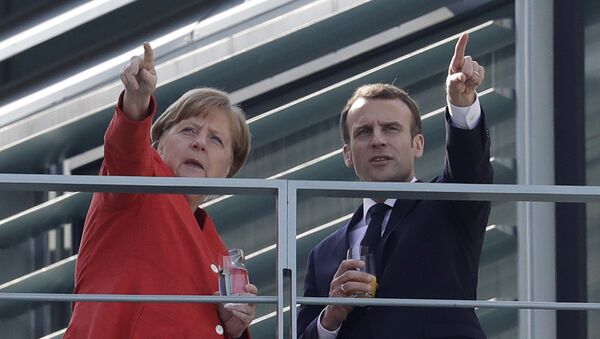German Chancellor Angela Merkel and French President Emmanuel Macron have proposed two versions of EU reform. While the two plans have much in common, there are also interesting differences. The two plans will reportedly be discussed at the upcoming EU summit in late June.
What the two plans agree on is the tightening of border controls and cooperation into migration policies. Both leaders seek to turn Europe's Frontex border force into a fully-operational border police which, in time, will be able to process asylum applications.
The two leaders also agree that the EU must work "more closely" with migrants' home countries, according to reports, particularly as migrants commonly ditch their official IDs so that the EU border officials do not know which country they arrived from, and so cannot send them back.
The two leaders also suggest closer cooperation with nations that surround the EU and note that there must be more opportunities for legal asylum in Europe to counter the "illegal migration," reviving a term that the EU has more recently been reluctant to use.
Alongside the more prosaic issues surrounding migration, a proposal to curb the power of the European Commission (EC) is notable. As a concrete measure, both leaders have called to reduce the number of European Commissioners; while Macron offers to halve the number, Merkel vaguely refers to "fewer than before."
The two favor the creation of a European army — a project long mulled within the EU. According to Macron, who recently attended a missile strike against Syria following Trump's lead, European military forces would engage in aggressive military operations abroad, while Merkel opposes this idea, suggesting that a defense of the European continent would be sufficient.
Merkel additionally advocates for an EU seat on the UN Security Council (Germany is not a permanent Security Council member), while Macron, as president of a permanent UNSC nation, opposes this. The German chancellor proposed the creation of a European Security council, which would allow the EU to play a more proactive role in foreign affairs.
Macron suggested that increased member contributions could contribute to a solution for the ongoing EU economic crisis, along with a proposal of an EU-wide corporation tax. This would put a sizable burden on both German and weaker EU-member businesses, as well as making EU membership less interesting for potential nations and their economies.
The German alternative includes a more sophisticated approach, which includes the creation of a European Monetary Fund which could "severely diminish power of the [European] commission."
Markel also advocates for the establishment of new investment funds, as a means of financing technological and scientific innovation, as well as ensuring that member states develop at a similar pace.
Merkel's plan does not elaborate who would provide the funds and by what means, however.





